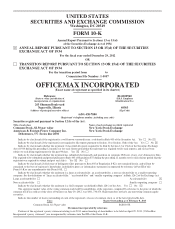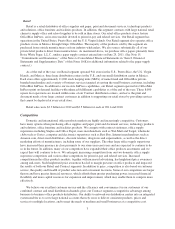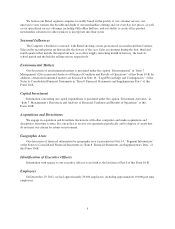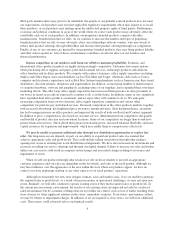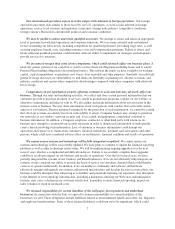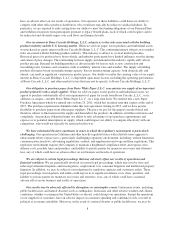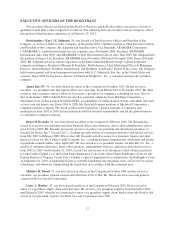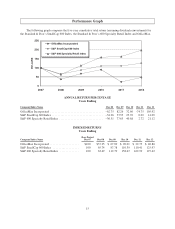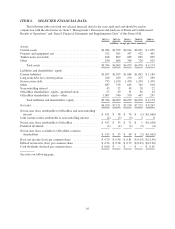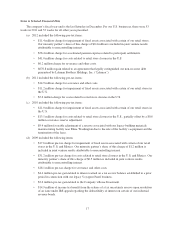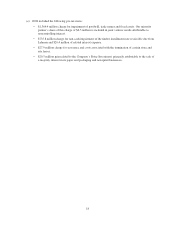OfficeMax 2012 Annual Report Download - page 44
Download and view the complete annual report
Please find page 44 of the 2012 OfficeMax annual report below. You can navigate through the pages in the report by either clicking on the pages listed below, or by using the keyword search tool below to find specific information within the annual report.have an adverse effect on our results of operations. Our exposure to these liabilities could harm our ability to
compete with other office products distributors, who would not typically be subject to similar liabilities. In
particular, we are exposed to risks arising from our ability to meet the funding obligations of our Pension Plans
and withdrawal requests from participants pursuant to legacy benefit plans, each of which could require cash to
be redirected and adversely impact our cash flows and financial results.
Our investment in Boise Cascade Holdings, L.L.C. subjects us to the risks associated with the building
products industry and the U.S. housing market. When we sold our paper, forest products and timberland assets,
we purchased an equity interest in Boise Cascade Holdings, L.L.C. This continuing interest subjects us to market
risks associated with the building products industry. This industry is subject to cyclical market pressures.
Historical prices for products have been volatile, and industry participants have limited influence over the timing
and extent of price changes. The relationship between supply and demand in this industry significantly affects
product pricing. Demand for building products is driven mainly by factors such as new construction and
remodeling rates, business and consumer credit availability, interest rates and weather. The supply of building
products fluctuates based on manufacturing capacity. Excess manufacturing capacity, both domestically and
abroad, can result in significant variations in product prices. Our ability to realize the carrying value of our equity
interest in Boise Cascade Holdings, L.L.C. is dependent upon many factors, including the operating performance
of Boise Cascade, L.L.C. and other market factors that may not be specific to Boise Cascade Holdings, L.L.C.
Our obligation to purchase paper from Boise White Paper L.L.C. concentrates our supply of an important
product primarily with a single supplier. When we sold our paper, forest products and timberland assets, we
agreed to purchase substantially all of our requirements of paper for resale from Boise Cascade, L.L.C., or its
affiliates or assigns, currently Boise White Paper L.L.C., on a long term basis. We entered into a new Paper
Purchase Agreement which we entered into on June 25, 2011, which has an initial term that expires at the end of
2017. The purchase requirements diminish under this new agreement starting in 2013, and we have greater
flexibility to purchase paper from other paper suppliers. The price we pay for this paper is market based and
therefore subject to fluctuations in the supply and demand for the products. In addition, until the restrictions end
completely, our purchase obligation limits our ability to take advantage of spot purchase opportunities and
exposes us to potential interruptions in supply, which could impact our ability to compete effectively with our
competitors, who would not typically be restricted in this way.
We have substantial business operations in states in which the regulatory environment is particularly
challenging. Our operations in California and other heavily regulated states with relatively more aggressive
enforcement efforts expose us to a particularly challenging regulatory environment, including, without limitation,
consumer protection laws, advertising regulations, escheat, and employment and wage and hour regulations. This
regulatory environment requires the Company to maintain a heightened compliance effort and exposes us to
defense costs, possible fines and penalties, and liability to private parties for monetary recoveries and attorneys’
fees, any of which could have an adverse effect on our business and results of operations.
We are subject to certain legal proceedings that may adversely affect our results of operations and
financial condition. We are periodically involved in various legal proceedings, which may involve state and
federal governmental inquiries and investigations, employment, tort, consumer litigation and intellectual property
litigation. In addition, we may be subject to investigations by regulatory agencies and customers audits. These
legal proceedings, investigations and audits could expose us to significant defense costs, fines, penalties, and
liability to private parties for monetary recoveries and attorneys’ fees, any of which could have a material
adverse effect on our business and results of operations.
Our results may be adversely affected by disruptions or catastrophic events. Unforeseen events, including
public health issues and natural disasters such as earthquakes, hurricanes and other adverse weather and climate
conditions, whether occurring in the United States or abroad, could disrupt our operations, disrupt the operations
of our suppliers or customers, have an adverse impact on consumer spending and confidence levels or result in
political or economic instability. Moreover, in the event of a natural disaster or public health issue, we may be
8



